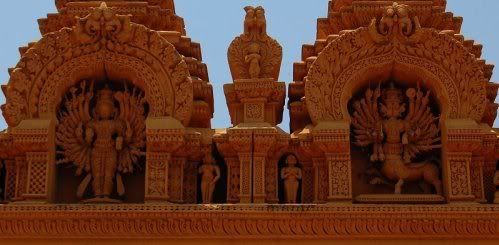When The Da Vinci Code, was released in Kerala, a state which has high Christian population, no one protested. There were long queues for the movie which according one theater owner generated interests second only to Titanic. That was not the case in Andhra Pradesh and Tamil Nadu where the Government pro-actively banned the movie.
The High Courts of both states vituperated the governments.The Andhra High Court told the government that, “the constitution does not confer or tolerate such individualised hyper-sensitive private censor intrusion into and regulation of guaranteed freedom of others.” The Madras High court, on similar lines, wrote, “artistic expressions may be asphyxiated by law if a petulant group of self-appointed `censors’ prescribes the paradigms for suspending the screening of a film.”
More opportunities for asphyxiating artistic expressions are on the way, but this time it will not be the state governments which will be acting.
In the much awaited Kamal Haasan movie, Dasavatharam, it seems there are scenes which show idols being destroyed in the clash between Shaivaites and Vaishnavites. Vishwa Hindu Parishad leader Vedantam has said that such scenes hurt the sentiments of Hindus all around the world and should be removed failing which they will resort to protests.
The second protest, which might start soon, is for the new Mike Myers movie, The Love Guru. In this movie, which also stars Ben Kingsley, Jessica Alba, and Justin Timberlake, Myers spoofs an Indian Guru who returns to Canada to get into the self help business. The fight over the movie has already started in United States with Rajan Zed, the Indian priest who was heckled by Christian fundamentalists in the Senate, stating that the movie “aids in creating negative stereotypes of Hindu characters. ” Deepak Chopra, the self-help guru, retaliated with a statement that anyone who opposes the movie is a fundamentalist.
Deepak Chopra is doing a cameo in the movie and has an upcoming book, Why Is God Laughing? , about comedy and religion and so has his own reasons for batting for Paramount and Mike Myers. That said, is this religion which survived Aurangzeb and Macaulay now facing the biggest threat from a Canadian comic? This Nawab of Arcot mentality will give free publicity to the movies and opportunities for violent mobs to destroy public property achieving nothing else. Movies come, go to DVD and their popularity would be fugacious, but something which has survived more than four millennia will live on.
, about comedy and religion and so has his own reasons for batting for Paramount and Mike Myers. That said, is this religion which survived Aurangzeb and Macaulay now facing the biggest threat from a Canadian comic? This Nawab of Arcot mentality will give free publicity to the movies and opportunities for violent mobs to destroy public property achieving nothing else. Movies come, go to DVD and their popularity would be fugacious, but something which has survived more than four millennia will live on.
If you are offended by these movie concepts, don’t watch it. Stay at home and get offended by the IPL cheerleaders.
And if we Hindus fail to ignore such Love Gurus, we have to go back to the Upanishads and Bhagavad Gita and start from scratch. Because we have not even understood the basic teachings of Hinduism.[Simply Ignore the Hollywood Movie The Love Guru and the Controversy]
As for Mr. Vedantam, there are many real temples in dilapidated state around the country hurting the sentiments of Hindus all around the world. If only he could worry about them, instead of fake idols in a movie.

